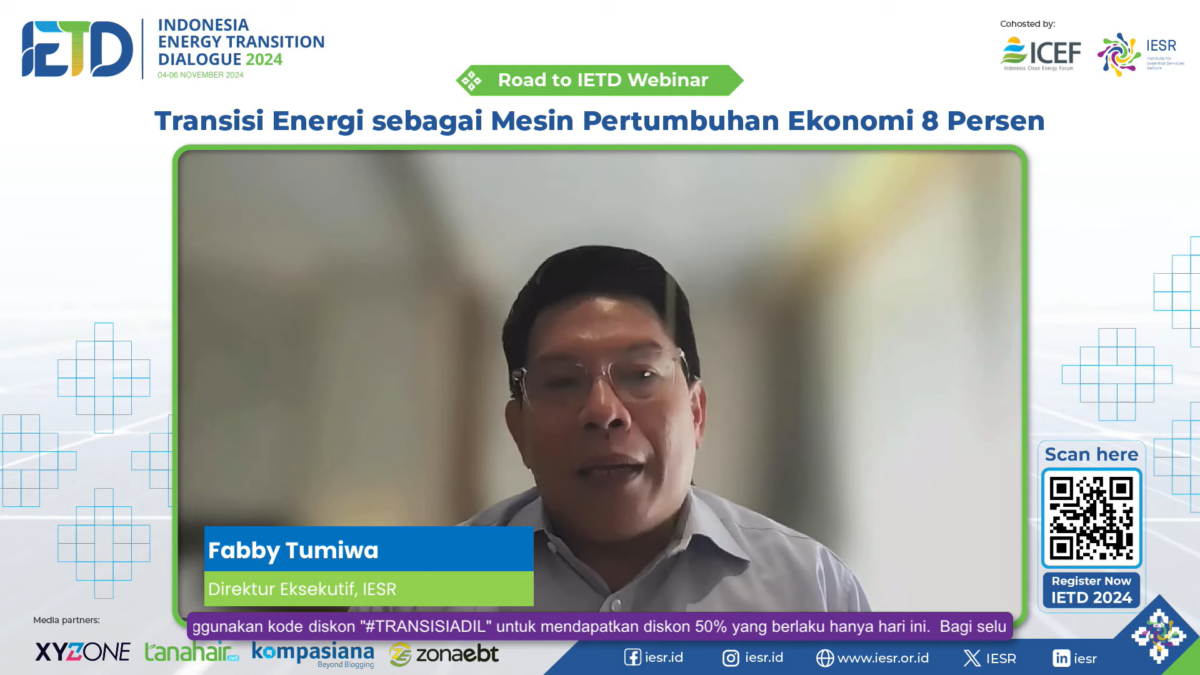Jakarta, October 10, 2024—President-elect Prabowo Subianto targets economic growth to increase to 8 percent during his administration. The Institute for Essential Services Reform (IESR) believes that accelerating the energy transition through renewable energy development can support the achievement of this target.
The Executive Director of IESR, Fabby Tumiwa, said that accelerating the energy transition is needed to fulfill Indonesia’s commitment to ratify the Paris Agreement to mitigate the earth’s temperature rise at 1.5 degrees Celsius. He says economic growth opportunities from the energy transition can be achieved through three renewable energy development pathways.
“To boost economic growth with the energy transition, it can be done by, first, diversifying the clean energy industry. The development of the renewable energy industry will stimulate our industrial sector by creating supply chain and manufacturing opportunities for renewable energy, such as solar cells and modules, wind turbines, and electric car components, and their supply chain industries. Second, the development of green infrastructure that can attract investment, such as transmission, smart grid, and energy storage. Third is the development of environmentally friendly ecotourism, such as the Bali Net Zero Emission (NZE) 2045 initiative. Suppose it succeeds in making Bali a Renewable Energy Island. In that case, it will provide added value to Bali tourism,” Fabby explained in the Road to Indonesia Energy Transition Dialogue (IETD) 2024 Webinar: Energy Transition as an Engine for 8 Percent Economic Growth, on Thursday (10/10/2024).
Fabby encourages the government to implement at least three policy reforms to open up investment opportunities in renewable energy. First, the government should reform fossil energy subsidies and carbon pricing by removing fossil energy subsidies that distort the market and make it difficult for renewable energy to compete and setting an effective carbon pricing policy. Second, reform infrastructure financing through using public fund instruments to attract investment and developing blended finance and green finance instruments such as green bonds to support renewable energy and energy efficiency projects, as well as optimizing climate funds such as using carbon taxes to finance the energy transition. Third, building international partnerships and cooperation. According to him, as the largest economy in ASEAN, Indonesia needs to position itself as a leader in global and Southeast energy partnerships and work with countries that master clean energy technology to encourage technology transfer and clean energy project funding.
Furthermore, IESR emphasizes that the energy transition process must be fair and inclusive to narrow the income gap. In addition, the benefits of the energy transition must be felt by the entire community. Martha Jesica, Coordinator of Social Policy and Economic Research, IESR, emphasized that the government needs to formulate fiscal policies that support a low-carbon economy and benefit the regional economy, for example, through the allocation of government spending for capital participation programs for business entities related to renewable energy and the green economy.
“A just energy transition is closely related to community participation and engagement with economic and energy development programs around them,” Martha added.
Ali Mundakir, a member of the Prabowo-Gibran Expert Council, revealed that the focus of Indonesia’s economic development is currently more on the mining and tourism sectors, whose contribution to the Gross Domestic Product (GDP) is only 8 percent and 5.8 percent, respectively. Meanwhile, Indonesia’s most significant income comes from the industrial and agricultural sectors, contributing around 30 percent to GDP. Ali explained that the Prabowo-Gibran administration would improve the condition of the national industry, including by building new economic engines in the digital, semiconductor, and green economy sectors.
Ali stated that renewable energy has great potential to achieve energy self-sufficiency in Indonesia. Optimizing renewable energy can significantly reduce imports of fuel oil (BBM) and Liquified Petroleum Gas (LPG). Currently, the utilization of renewable energy is still relatively small, but it provides an excellent opportunity to be explored and developed further.
“One of the steps that need to be taken is to improve the investment climate in this sector, making it more attractive for stakeholders to invest. Then, the development of smart grids will also be an important target in the next five years in optimizing solar and wind energy production. In addition, increasing electricity supply from renewable energy requires a breakthrough that is cleaner and free of carbon dioxide emissions and can be developed on a large scale at an affordable cost,” Ali said.
The Indonesia Energy Transition Dialogue (IETD) 2024, which will be held on November 4-6, 2024, will comprehensively discuss a clear and targeted strategy to promote a just energy transition. Registration for the IETD 2024 event can be accessed via ietd.info.

